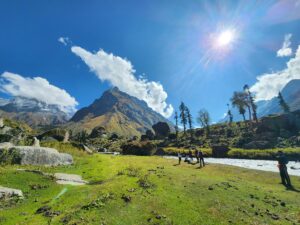Path to Oneself: Embracing Solitude and Self-Discovery Through Solo Hiking


Solo hiking offers an unparalleled opportunity to immerse oneself in the quiet majesty of nature while engaging in deep personal reflection. It’s a practice that challenges the body and nourishes the soul, offering moments of solitude that are increasingly rare in our connected world. If you plan to embark on a solo hiking journey, here are some essential insights and tips to ensure your experience is transformative and safe.
Understand the Appeal of Solo Hiking
Solo hiking allows you to set your own pace and itinerary, listen to the natural world without interruption, and step meaningfully outside your comfort zone. The solitude affords a unique chance to introspect and reconnect with your inner self away from the noise of everyday life.
Choose the Right Trail
When hiking alone, selecting the right trail is crucial. Opt for trails within your skill level, known for being well-marked and moderately trafficked. While complete isolation might seem appealing, a trail with occasional fellow hikers can ensure safety without compromising your solitude. Researching the trail beforehand, reading reviews, and understanding the terrain and expected weather conditions can also enhance your preparedness.
Inform Someone of Your Plans
Safety should always be a priority. Always inform a friend, family member, or park ranger of your hiking plan and expected return time. Leave them a map or detailed directions to the trail you intend to hike, your car’s make and license plate number, and any other pertinent information.
Pack Smart
Packaging efficiently is more than a convenience for a solo hike—it’s a necessity. Essentials include a map and compass (or a GPS device), more water than you think you’ll need, high-energy snacks, a first-aid kit, a flashlight or headlamp, and appropriate clothing. Also, consider a portable charger for your phone and possibly a satellite messenger or personal locator beacon, especially if you are venturing into remote areas.
Embrace the Silence
One of the most rewarding aspects of solo hiking is the silence. Allow yourself to engage with your environment fully—listen to the rustle of leaves, the calls of birds, and the whisper of the wind. This immersive experience can be incredibly soothing and is often where the deepest reflections occur.
Start Early and Keep Time
Starting early helps maximize daylight hours and gives you ample time to return before dusk. Keeping track of time is important to avoid being caught in the dark or rushing through your hike, which can increase the risk of accidents.
Stay Alert and Trust Your Instincts
When you’re hiking alone, your instincts are your best guide. Stay alert to your surroundings and the trail conditions. If something feels off—whether it’s a sudden change in weather, an encounter with wildlife, or an uncomfortable feeling about a particular path—trust your gut and act accordingly. It’s okay to turn back if you feel uneasy or conditions worsen.
Document Your Journey
Consider carrying a lightweight journal or camera to document your thoughts and sights along the trail. These reflections and images can be a wonderful way to remember the journey and the insights gained. They also provide a means of sharing your experiences with others or simply revisiting them yourself.
Practice Mindfulness
Solo hiking is an excellent opportunity to practice mindfulness. Focus on your breath, the steady rhythm of your steps, and the details in the natural world around you. This mindful presence can heighten the experience, making it more enriching and meditative.
Respect Nature
As a solo hiker, you are a guest in the natural world. Practice Leave No Trace principles: pack out everything you bring in, stay on designated trails to protect the flora, and avoid disturbing wildlife. These practices ensure the trails remain beautiful and accessible for others and help preserve the natural habitat.
Reflect on Your Experience
After your hike, take some time to reflect on your experience. What did you learn about yourself? How has the journey impacted your view of the world? These reflections can deepen the personal growth of solo hiking and inspire future adventures. Solo hiking is more than just a physical challenge; it’s a spiritual journey that offers a unique blend of adventure, solitude, and self-discovery. By preparing thoroughly and approaching the experience with respect and openness, you can safely enjoy the profound benefits of spending time alone in the great outdoors.
